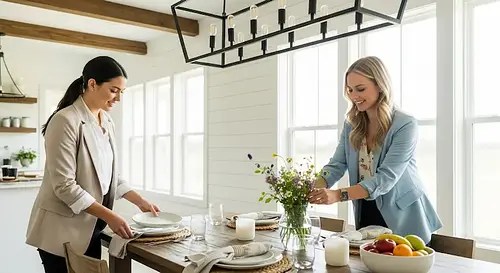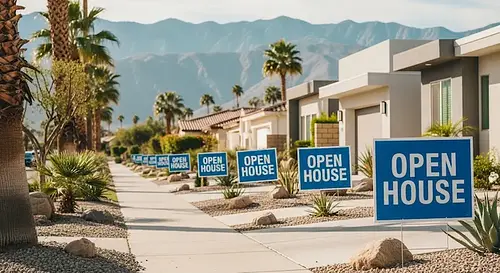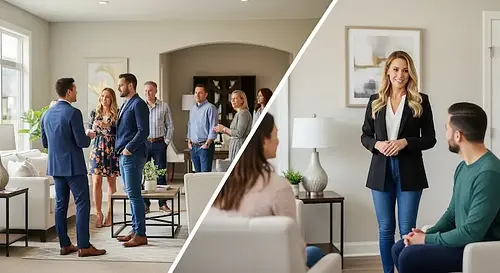Open House Feedback Form: Free Template For Real Estate Agents
An open house feedback form helps you capture what buyers are really thinking—so you can improve showings, impress sellers, and follow up with confidence. In this guide, you’ll get expert tips, the best questions to ask, and a free Google Form template to start using today.

Written by Seth Cox
Jun 23, 2025 / Open house marketing
Unlike a traditional open house sign-in sheet, which simply captures names and contact details, an open house feedback form digs deeper. It asks visitors what they liked, what they didn’t, how they felt about the pricing, and whether they could see themselves living in the home. The goal isn’t just data collection—it’s about capturing buyer sentiment while it’s fresh, identifying hot leads, and gathering real-time feedback you can use to inform your seller or fine-tune your marketing strategy.
Whether you're hosting a high-end luxury listing or a starter home, using a structured feedback form shows professionalism, generates better leads, and gives you an edge in competitive markets. In this guide, we’ll show you exactly what to include, how to share it, and where to grab a free open house feedback form template you can start using right away.

Open House Feedback Form vs. Sign-In Sheet: What’s the Difference?
An open house feedback form, on the other hand, goes beyond contact details. It asks questions about the visitor’s experience: what they thought of the home, how it compares to others they’ve seen, and whether they’d consider making an offer. This kind of open house feedback helps agents:
- Understand how the property is being received
- Spot red flags early (like pricing or layout concerns)
- Collect insights to share with the seller
- Qualify leads based on buying intent
Tip: Many top-performing agents use both tools together: a sign-in form at the beginning of the tour, and a feedback form at the end.

Why Open House Feedback Matters for Real Estate Agents
Here’s why collecting feedback at open houses is so important:
- Refine Your Open House Strategy
- If buyers consistently mention that the layout feels awkward or the price feels high, you can adjust your messaging—or even your listing price—to better align with buyer expectations.
- Impress Your Sellers with Real Data
- Sellers love to see that their agent is proactive. By showing them what buyers are saying (in their own words), you build trust and set the stage for constructive conversations about pricing or staging improvements.
- Identify Serious Buyers Faster
- Feedback forms often reveal whether a guest is just browsing or actively looking. That means you can prioritize your follow-up and avoid wasting time on cold leads.
- Improve Future Open Houses
- You’ll learn what guests liked or disliked about the setup, flow, or presentation—so your next event is even stronger.
Using an open house feedback form isn’t just about being thorough—it’s about using data to make better decisions, deliver a better client experience, and ultimately close more deals.

What to Include on an Effective Open House Feedback Form
Basic Contact Information
- Name
- Email address
- Phone number
Buyer Intent and Timeline
- Are you actively looking for a home?
- What’s your buying timeline?
- (ASAP, 1–3 months, 3–6 months, just browsing)
Property Impressions
- What did you like most about the home? (open-ended)
- What did you like least? (open-ended)
- Could you see yourself living in this home? (Yes / No / Maybe)
Price Perception
- How do you feel about the price of this home?
- (Overpriced / About right / Underpriced / Not sure)
Home Condition and Agent Experience
- How would you rate the overall condition of the home?
- (Excellent, Good, Fair, Poor)
- How helpful was the hosting agent? This can be helpful if the host is hosting for another agent.
- (Very helpful, Somewhat helpful, Not helpful)
Final Comments or Suggestions
Keep your form to 8–10 questions max. That’s the sweet spot for collecting useful feedback without killing your response rate. In the next section, we’ll walk through the best ways to share and collect your open house feedback form—without making it feel like a hassle for your guests.

How to Share and Collect Feedback Effectively
Here’s how to get the most responses from your feedback form:
Display a QR Code at the Property
Offer a Tablet or iPad at the Open House
Use a Friendly Tone and a Clear Call to Action

Free Open House Feedback Form Template
This mobile-friendly template is perfect for sharing via QR code, tablet, or post-event email. It’s designed to capture the most important insights—without overwhelming your guests.
Open House Feedback Form Questions Included
- Optional name and email fields
- Buying timeline question
- “Do you see yourself living in this home?” (Yes/No/Maybe)
- Open-ended likes and dislikes
- Condition and agent rating scales
- Follow-up request checkbox
The form is easy to update with your logo, color scheme, or custom questions. Whether you're hosting a luxury listing or a first-time buyer open house, this template will help you collect valuable data and deliver a more polished experience.

What to Do with Open House Feedback Form Submissions
Here’s how to turn your form submissions into real business results:
Review Responses Within 24 Hours
Tag and Sort Leads by Buying Timeline
- Follow up immediately with “ASAP” buyers
- Set reminders for future check-ins with longer-term leads
- Exclude “just browsing” guests unless they show strong interest
If you’re using a CRM like Follow Up Boss, you can easily tag contacts based on their feedback.
Share Key Takeaways with the Seller
- What buyers liked
- What raised concerns
- How the price is being perceived
This builds trust and keeps the seller engaged in the sales process—especially if you're recommending a price change or home improvements.
Improve Future Open Houses
Log Feedback for Long-Term Trends

FAQs About Open House Feedback Forms
What is an open house feedback form?
What’s the difference between an open house feedback form and an open house sign-in sheet?
How many questions should be on an open house feedback form?
Should I ask for contact information on the feedback form?
Is it better to use paper or digital feedback forms?
When’s the best time to ask for feedback?
Can I reuse the same form for every open house?
Final Thoughts: Make Feedback a Strategic Advantage
By asking the right questions, sharing your form at the right time, and actually putting the feedback to use, you’ll stand out in a crowded market. And with tools like our free Google Form template—or automated solutions like Showable—you can turn every showing into a growth opportunity.
Click here to copy the open house feedback form template (Google Form)






